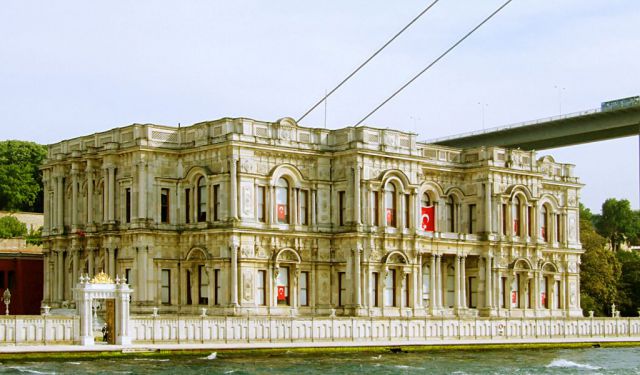
Golden Gate, Istanbul
The Golden Gate in Istanbul is an impressive reminder of the city's deep history from the Byzantine era. Located on the city's old walls' south-north line, it's the first gate you come across when moving in that direction. The Golden Gate was mainly used for grand ceremonies, like welcoming emperors back from wars, crownings, and occasionally, very special guests, including a few visits from popes in the years 519, 868, and a notable one from Pope Constantine in 710.
As the Byzantine Empire's military strength declined, changes were made to the gate; it was eventually sealed off and made smaller, turning into a sort of fortress. The Golden Gate didn't just leave a mark on Istanbul; it inspired the construction of similar grand gates in cities like Thessaloniki, Antioch, Kiev, and Vladimir, and even influenced the naming of the Golden Gate in San Francisco, California, as a tribute to Byzantine influence.
The exact time when the Golden Gate was built is still debated by historians, with opinions varying between the reigns of Theodosius I and II, though most agree it was likely the latter. From an architectural standpoint, the gate is known for its polished white marble, put together without any cement into a grand arch flanked by two smaller ones, and supported by two large towers. It was a busy passageway, decorated with statues including one of Theodosius I, and had seen damage from earthquakes and attacks over the years, losing many of its original decorations.
Even though it started as a ceremonial gate, the Golden Gate was also built strong enough to defend the city against attacks. Today, it stands as a testament to the greatness and strategic savvy of Byzantine Constantinople, reminding us of the city's historical importance and the legacies of its rulers.
As the Byzantine Empire's military strength declined, changes were made to the gate; it was eventually sealed off and made smaller, turning into a sort of fortress. The Golden Gate didn't just leave a mark on Istanbul; it inspired the construction of similar grand gates in cities like Thessaloniki, Antioch, Kiev, and Vladimir, and even influenced the naming of the Golden Gate in San Francisco, California, as a tribute to Byzantine influence.
The exact time when the Golden Gate was built is still debated by historians, with opinions varying between the reigns of Theodosius I and II, though most agree it was likely the latter. From an architectural standpoint, the gate is known for its polished white marble, put together without any cement into a grand arch flanked by two smaller ones, and supported by two large towers. It was a busy passageway, decorated with statues including one of Theodosius I, and had seen damage from earthquakes and attacks over the years, losing many of its original decorations.
Even though it started as a ceremonial gate, the Golden Gate was also built strong enough to defend the city against attacks. Today, it stands as a testament to the greatness and strategic savvy of Byzantine Constantinople, reminding us of the city's historical importance and the legacies of its rulers.
Want to visit this sight? Check out these Self-Guided Walking Tours in Istanbul. Alternatively, you can download the mobile app "GPSmyCity: Walks in 1K+ Cities" from Apple App Store or Google Play Store. The app turns your mobile device to a personal tour guide and it works offline, so no data plan is needed when traveling abroad.
Golden Gate on Map
Sight Name: Golden Gate
Sight Location: Istanbul, Turkey (See walking tours in Istanbul)
Sight Type: Attraction/Landmark
Guide(s) Containing This Sight:
Sight Location: Istanbul, Turkey (See walking tours in Istanbul)
Sight Type: Attraction/Landmark
Guide(s) Containing This Sight:
Walking Tours in Istanbul, Turkey
Create Your Own Walk in Istanbul
Creating your own self-guided walk in Istanbul is easy and fun. Choose the city attractions that you want to see and a walk route map will be created just for you. You can even set your hotel as the start point of the walk.
Old European Quarter Walk
Back in the Ottoman era, the Beyoğlu neighborhood (then known as Pera) together with Galata formed the European Quarter of Istanbul. Home to embassies and trading centers, as well as the fine 19th-century, Parisian-style apartment houses, this area was much loved by the city's non-Islamic minorities.
Its growth was boosted by the opening of the Orient Express line, connecting Paris to... view more
Tour Duration: 2 Hour(s)
Travel Distance: 2.4 Km or 1.5 Miles
Its growth was boosted by the opening of the Orient Express line, connecting Paris to... view more
Tour Duration: 2 Hour(s)
Travel Distance: 2.4 Km or 1.5 Miles
Istanbul Introduction Walking Tour
Formerly known as “Byzantium”, “Constantinople” and “New Rome”, Istanbul is the main city of Turkey, straddling the Bosphorus Strait, and as such, bridging the gap between Europe and Asia, both geographically and culturally. This ancient transcontinental metropolis embraces cultural influences of the many empires and civilizations that once ruled and flourished on this land.
... view more
Tour Duration: 2 Hour(s)
Travel Distance: 4.3 Km or 2.7 Miles
... view more
Tour Duration: 2 Hour(s)
Travel Distance: 4.3 Km or 2.7 Miles
Byzantine Heritage Walking Tour
Originated as a Greek city called Byzantium, what's now known as Istanbul initially made name as Constantinople, an Eastern Roman imperial capital whose greatness had lasted for over a millennium, from 330 AD until the Ottoman invasion in 1453.
The Byzantine Empire’s rich cultural and architectural heritage is still preserved in dazzling sites throughout the city. Away from its Islamic... view more
Tour Duration: 2 Hour(s)
Travel Distance: 2.5 Km or 1.6 Miles
The Byzantine Empire’s rich cultural and architectural heritage is still preserved in dazzling sites throughout the city. Away from its Islamic... view more
Tour Duration: 2 Hour(s)
Travel Distance: 2.5 Km or 1.6 Miles
Istanbul City Walls
One of the most elaborate fortification systems of ancient times, the Walls of Constantinople were built by Constantine the Great to protect the city, the then newly-established capital of the Eastern Roman Empire, from attacks by land and sea. Of these, only the Golden Gate, an old ceremonial gateway into the city, had survived by the late Byzantine Era when a new series of land walls were added... view more
Tour Duration: 2 Hour(s)
Travel Distance: 5.2 Km or 3.2 Miles
Tour Duration: 2 Hour(s)
Travel Distance: 5.2 Km or 3.2 Miles
Istanbul Old City Walking Tour
Situated at the heart of Old Istanbul, the Sultanahmet neighborhood is a fascinating hub of historical timeline. Dramatically located on a peninsula pointing across the Bosphorus Strait to Asia, this area was formerly an administrative pole of the Roman, Byzantine and Ottoman empires, and as such, reflects numerous influences of the cultures once prevalent here.
Whether you feel like walking... view more
Tour Duration: 2 Hour(s)
Travel Distance: 2.3 Km or 1.4 Miles
Whether you feel like walking... view more
Tour Duration: 2 Hour(s)
Travel Distance: 2.3 Km or 1.4 Miles
Asian Side and Bosphorus Walking Tour
Istanbul is the only megalopolis in the world that straddles two continents. The Bosphorus Strait splits Turkey's biggest city into two parts: European and Asian. The latter, known locally as Asya Yakası (“Asian Side”), or more commonly as Anadolu Yakası (“Anatolian Side”), is found east of the strait, geographically on the Asian mainland.
The vast Anatolian shore, wrongly... view more
Tour Duration: 2 Hour(s)
Travel Distance: 4.6 Km or 2.9 Miles
The vast Anatolian shore, wrongly... view more
Tour Duration: 2 Hour(s)
Travel Distance: 4.6 Km or 2.9 Miles
Useful Travel Guides for Planning Your Trip
Istanbul Shopping Guide: 16 Turkish Items To Bring Home
Istanbul, known throughout history as Byzantium and Constantinople, has been a major center of commerce and trade, a place where merchants and general folk would rush to regularly in search of exotic things. In our days, modern travelers to Istanbul are also bound to enjoy a truly magnificent...







